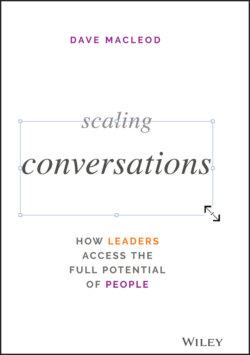Читать книгу Scaling Conversations - Dave MacLeod - Страница 15
Process Capital
ОглавлениеProcess capital is best summed up in the phrase “Never about me without me.” This capital is what can be generated when leaders include people who are affected by decisions in the decision process, fairly and transparently. Much has been written about fair process and a quick search can find articles on sites such as the Harvard Business Review talking about the components and benefits. Here is how I have synthesized the studies and suggestions as they relate to scaling conversations.
The idea of fair process breaks into two concepts. The core idea of “never about me without me” is that, as intelligent humans, people prefer to be listened to when decisions are made about them. Simple. When that is accomplished, capital is generated. Even when leaders make mistakes with a change or decision, the fact that they showed people they respected them and listened to their ideas goes a long way to keeping people motivated and connected to the organization.
The second concept of fair process is that people will support and prefer the outcomes of decisions with better process, even with worse outcomes in some cases. Research on this topic has uncovered some extreme examples where participants in study groups were found to prefer worse decisions that had a good process than better decisions with a poor process. I think of this as the “tasty bad dinner” phenomenon. The essence is, people will be happier in a worse restaurant with worse food, and the food will even taste better, if they felt the decision to go to that particular restaurant was fair. By contrast, people will find a reason to complain about excellent food in a fantastic restaurant if they don't like how they were forced to go there. We humans value fair process deeply.
The underpinning of all of this is trust. People don't need to have things go 100% their way and they understand decisions are complex and leaders can't make everyone happy. Rather than hope for their ideas to be explicitly heard and actioned, more importantly people just want to ensure leaders are educating themselves as much as possible, and listening to the voices of the people affected, before making decisions that will impact them.
Once the process of how leaders maximize voice in decision‐making is well understood by everyone, process capital is created. People believe in leaders who demonstrate fair process and who listen at scale. They will get behind decisions made by leaders whose process they can understand and they believe in.
To get at this on a personal level, ask yourself: Who are the leaders you trust most? What do you believe to be true about how they make decisions? I believe you find them to be open to learning and known for being so.
Here are some questions leaders have asked on scale to show fair process as they work to address emergent challenges as rapidly as possible while ensuring as many people as possible are onboard:
What can we do as an organization to better support our Black team members?
What are your concerns, thoughts and questions as we make plans for re‐opening?
What does leadership need to consider as we work through this transformation?
What are your thoughts or questions on the new comp plan?
In each of these question examples, changes need to be made that affect people on a very deep level and the first step is to be curious with as many people as possible to show fair process in decision making. McKinsey partners Andrea Alexander, Aaron De Smet and Leigh Weiss wrote about this in 2020 in their article “Decision Making in Uncertain Times.” They highlighted the importance of including as many people as possible to ensure fast and successful decisions. The challenge of course is: How?
The good news about process capital is that it is plentiful during a crisis. The more we experience change in our organizations, the more we have the chance to increase process capital by asking people for their voice, not their vote, in decisions that affect them.
